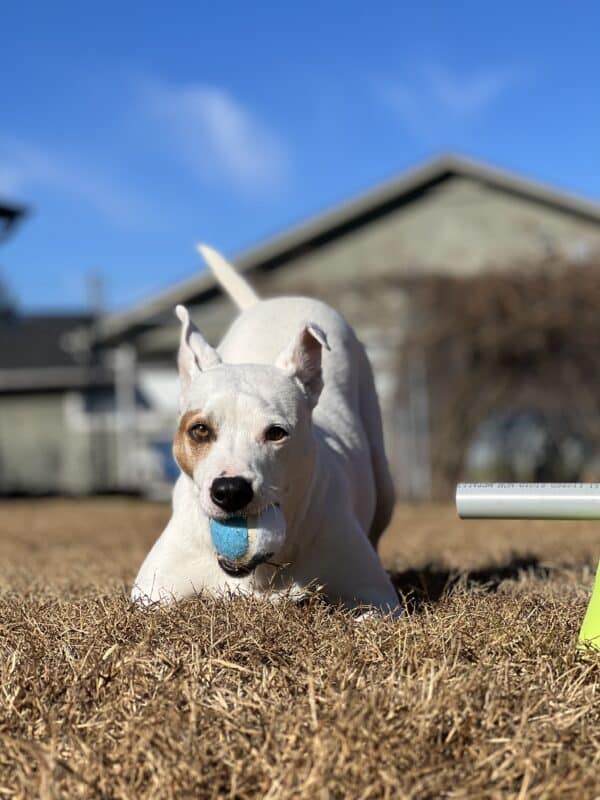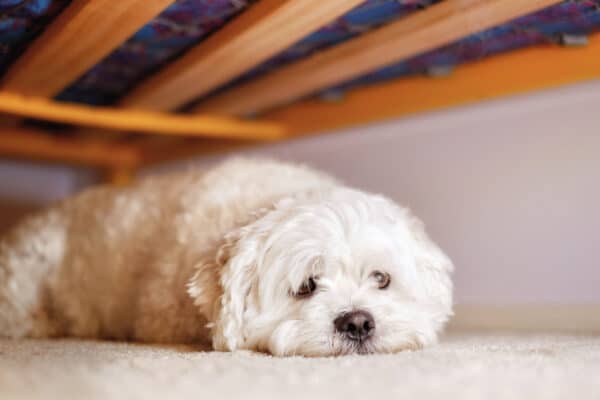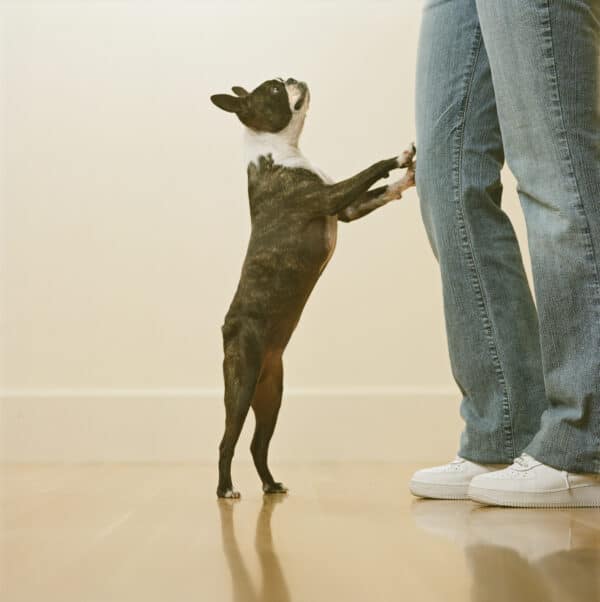Can dogs really be low maintenance? Likewise, are some dog breeds truly high maintenance? Yes and yes — although some of the reasons may surprise you. Here are some helpful factors to consider, along with a list of breeds that are generally the best low maintenance dogs to consider as your next best bud.
First, what makes a dog low maintenance?
Honestly, this question makes many experts chuckle! There’s no such thing as a one-size-fits-all, low maintenance dog — that was the first reaction from Dr. Bruce F. Smith, professor at Auburn University’s College of Veterinary Medicine. It can be a trick question, considering the wide range of dog breeds.
But the more he thought about it, Dr. Smith agrees that some dogs are definitely easier to care for than others. There are a lot of helpful generalizations that can guide us toward certain breeds.
But perhaps the most important key to finding the perfect pup? Evaluating your own lifestyle to find the most compatible companion to fit into your daily routine.
What makes the best low-maintenance dog?
Thinking about your future furry friend is a great sign because it means you’re taking your commitment seriously. When you evaluate dogs in terms of low (or high) maintenance, what you’re really thinking about is their care — how much time, energy and effort you can honestly put into the relationship.
Here are three criteria to keep in mind:
- Grooming needs, which depends on the breed.
- Health issues, which can be very breed specific. Dr. Smith recommends researching the breeds you’re considering to determine known health issues, having dogs tested for inherited traits and asking about dogs’ family histories. Health issues can be unknown with dog adoptions, rescues and mixed breeds, but Dr. Smith says a veterinarian’s exam can provide expert insight into possible breeding clues and characteristics.
- Energy level is a big factor — for you and your future furry friend. Are you an active, outdoor-oriented person hoping for a walking, hiking or running companion? Or are you a happy homebody with a WFH lifestyle, seeking a pup to match? Consider your lifestyle and search for a dog that will compliment — not stretch or restrict — you.
Does low maintenance mean dogs never need exercise, playtime or daily walks?
Absolutely not, says Dr. Smith. He runs through the minimum interactions that adult dogs need, noting that puppies’ needs are much higher:
- Bathroom breaks, at least three or four times, daily. Most dogs need to go out first thing in the morning, when you get home from work, and before going to bed for the night — at a minimum.
- At least one daily meal. Talk to your veterinarian about your dog’s specific requirements, but Dr. Smith says using a high-quality kibble can result in much smaller fecal volumes — which means another low-maintenance perk: less poop!
- Free-choice water, meaning it is always available to your dog. Water should be changed every 6 to 12 hours.
- Daily grooming that averages 10 minutes per day.
- At least 30 minutes of daily exercise, which could include walking around the block, chasing a ball or romping at the dog park.
- And at least 30 minutes of daily social interaction. Most dogs are happiest when living with their pack, which includes their humans. That means most dogs should live in the house — not kept in a kennel or outside run.
All things considered, if these minimums seem too relaxed, then your ideal pup may actually be a social, playful and active dog on the high maintenance side.
What are high-maintenance dogs?

Generally, Dr. Smith says high maintenance dogs can be defined as high energy dogs that look to their humans for a lot of interaction. In other words, they require attention.
Several breeds (or mixes of these breeds) that come to mind are:
- Australian Shepherds
- Australian Cattle Dogs
- Border Collies and other herding breeds
These active, intelligent dogs love to have jobs. As a result, if you leave the house for work every day, chances are they’d love to join you! Since they thrive on activity and stimulation, they wouldn’t be happy about being cooped up in the house all day. These breeds need a job and Dr. Smith says if they don’t have one, they’ll create one — even if that involves herding your furniture, the cat or the neighbor’s children!
Ok, which dog breeds are known for being low maintenance and why?
- Small dogs. In general, smaller dogs with short coats are usually the first dogs that come to mind, and Dr. Smith confirms that’s often true. Additionally, small breeds can require less living space, which means they’re better suited to apartment lifestyles.
- Poodles are one of the most popular low-maintenance dog breeds because their hair sheds less than other dog breeds and they are highly trainable and intelligent. But Dr. Smith reminds potential Poodle parents that their pups still need to be groomed regularly, and larger Poodle varieties need a significant amount of exercise and mental stimulation, or they may not seem so low-maintance.
- Oodles — designer dogs that are part Poodle — include Cavapoos, Bernadoodles, and Cockapoos. One of the reasons they’re so popular (besides being cute) is that, thanks to their Poodle parent, their fur sheds less, which can be beneficial to people who suffer from allergies. However, being part Poodle means they have a combination of both energy and intelligence, which means your individual Oodle, specifically Labradoodles, Goldendoodles and Aussiedoodles, could be more high-rather than low maintenance.
- Cavalier King Charles Spaniels are considered one of the friendliest and calmest dog breeds, and they’re also small — low maintenance characteristics.
- Maltese are gentle, quiet dogs whose fur sheds less than most. Dogs who bark less frequently can be one way to define low maintenance!
- Greyhounds, says Dr. Smith, may seem like a surprising example of a low maintenance dog given their size, but their couch potato reputation lands them squarely on this list! A typical adult Greyhound, Dr. Smith describes, runs like the wind for 30 minutes, eats and socializes for 30 minutes, then snoozes for the other 23 hours.
- Italian Greyhounds and Whippets may require even less exercise than their Greyhound cousins, says Dr. Smith.
Now, here’s a wild card. Amy Kaunas, executive director of Pennsylvania’s Humane Society of Harrisburg Area encourages pet parents to consider dogs up for adoption at local animal shelters and rescues. While some of their breeds may be identified, others are a mystery. But her advice is not to focus on breeds, but to prioritize lifestyle and companionship.
Amy says that while her organization has a rigorous adoption process — which she admits, earns some negative feedback — it ultimately results in fewer dogs bouncing back to the shelter. Instead, knowledgeable adoption counselors guide good matchmaking between pups and parents.
Are small dogs lower maintenance than big dogs?
Although many small dogs are indeed lower maintenance, there are exceptions to every rule. Here are a few examples.
Brachiocephalic (or short nosed) dogs like the French Bulldog and Boston Terrier are often considered low maintenance dogs, Dr. Smith says, because they are smaller and have short hair. However, he advises potential pup parents to consult with their veterinarian and breeder first, because their compressed face structure can lead to lifelong health problems.
Can training help a dog become low maintenance?
Personality and training both play a role in a dog’s maintenance level. Easy-going, calm breeds tend to show less separation anxiety when they’re left alone for periods of time. And many dogs can be trained to handle longer periods of time alone.
Training, says Dr. Smith, is important for several reasons:
- It makes a dog more responsive to the owner — and therefore more pleasant to be around.
- Training provides structured social interaction and reinforces who the pack leader is.
- And training can be used to address specific issues.
Let’s be honest: Is a low maintenance dog a good fit for everyone?
It is absolutely possible to work full time and have a low maintenance, stay-at-home dog, says Dr. Smith. However, he reminds pet parents that a pup may impact your ability to work extra hours, go out for drinks afterward, lead an active social life or travel frequently. In these cases, a low maintenance dog will probably require more attention than you have time to give. And if you come to that realization, Amy says you may actually be in the market for a furry friend of a different kind — a cat!
In summary, there are many choices and factors when it comes to finding a fur-ever friend. A low-maintenance dog is the key for many people, while others are better matched with high-maintenance breeds. Ultimately, the most important sign of success is a rewarding relationship with your pup. And one more factor sweetens the deal — Dr. Smith reminds us that people lead healthier lives, with lower blood pressure and longer lifespans, when a dog is by their side.
Featured Image Credit: Danilo Andjus/Getty Images






